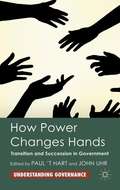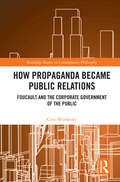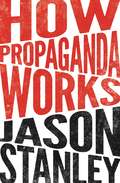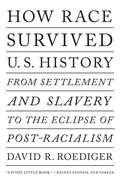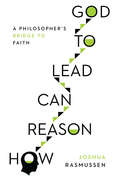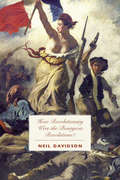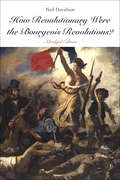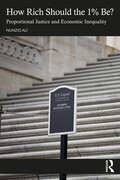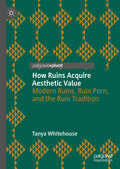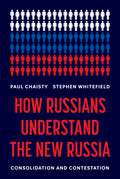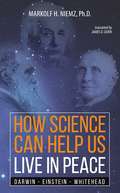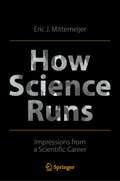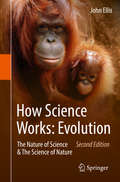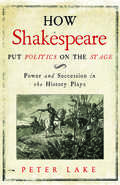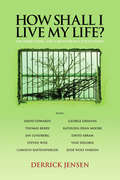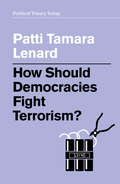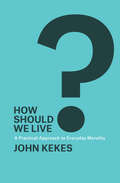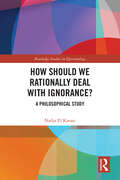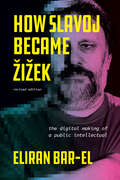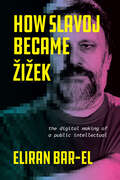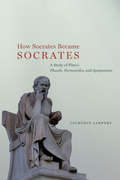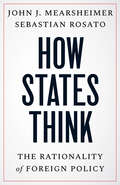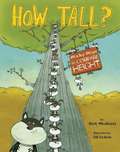- Table View
- List View
How Power Changes Hands
by Paul ’t Hart John UhrHow can we strengthen the capacity of governments and parties to manage arrivals and departures at the top? Democracy requires reliable processes for the transfer of power from one generation of leaders to the next. This book introduces new analytical frameworks and presents the latest empirical evidence from comparative political research.
How Propaganda Became Public Relations: Foucault and the Corporate Government of the Public (Routledge Studies in Contemporary Philosophy)
by Cory WimberlyHow Propaganda Became Public Relations pulls back the curtain on propaganda: how it was born, how it works, and how it has masked the bulk of its operations by rebranding itself as public relations. Cory Wimberly uses archival materials and wide variety of sources — Foucault’s work on governmentality, political economy, liberalism, mass psychology, and history — to mount a genealogical challenge to two commonplaces about propaganda. First, modern propaganda did not originate in the state and was never primarily located in the state; instead, it began and flourished as a for-profit service for businesses. Further, propaganda is not focused on public beliefs and does not operate mainly through lies and deceit; propaganda is an apparatus of government that aims to create the publics that will freely undertake the conduct its clients’ desire. Businesses have used propaganda since the early twentieth century to construct the laboring, consuming, and voting publics that they needed to secure and grow their operations. Over that time, corporations have become the most numerous and well-funded apparatuses of government in the West, operating privately and without democratic accountability. Wimberly explains why liberal strategies of resistance have failed and a new focus on creating mass subjectivity through democratic means is essential to countering propaganda. This book offers a sophisticated analysis that will be of interest to scholars and advanced students working in social and political philosophy, Continental philosophy, political communication, the history of capitalism, and the history of public relations.
How Propaganda Works
by Jason StanleyOur democracy today is fraught with political campaigns, lobbyists, liberal media, and Fox News commentators, all using language to influence the way we think and reason about public issues. Even so, many of us believe that propaganda and manipulation aren't problems for us--not in the way they were for the totalitarian societies of the mid-twentieth century. In How Propaganda Works, Jason Stanley demonstrates that more attention needs to be paid. He examines how propaganda operates subtly, how it undermines democracy--particularly the ideals of democratic deliberation and equality--and how it has damaged democracies of the past.Focusing on the shortcomings of liberal democratic states, Stanley provides a historically grounded introduction to democratic political theory as a window into the misuse of democratic vocabulary for propaganda's selfish purposes. He lays out historical examples, such as the restructuring of the US public school system at the turn of the twentieth century, to explore how the language of democracy is sometimes used to mask an undemocratic reality. Drawing from a range of sources, including feminist theory, critical race theory, epistemology, formal semantics, educational theory, and social and cognitive psychology, he explains how the manipulative and hypocritical declaration of flawed beliefs and ideologies arises from and perpetuates inequalities in society, such as the racial injustices that commonly occur in the United States. How Propaganda Works shows that an understanding of propaganda and its mechanisms is essential for the preservation and protection of liberal democracies everywhere.
How Race Survived US History: From Settlement and Slavery to the Eclipse of Post-racialism
by David R. RoedigerAn absorbing chronicle of the role of race in US history, by the foremost historian of race and laborThe Obama era produced countless articles arguing that America’s race problems were over. The election of Donald Trump has proved those hasty pronouncements wrong. Race has always played a central role in US society and culture. Surveying a period from the late seventeenth century—the era in which W.E.B. Du Bois located the emergence of “whiteness”—through the American Revolution and the Civil War to the civil rights movement and the emergence of the American empire, How Race Survived US History reveals how race did far more than persist as an exception in a progressive national history. This masterful account shows how race has remained at the heart of American life well into the twenty-first century.
How Reason Can Lead to God: A Philosopher's Bridge to Faith
by Joshua RasmussenDo you seek the truth?
How Revolutionary Were the Bourgeois Revolutions?
by Neil Davidson“An impressive contribution both to the history of ideas and to political philosophy.” —Alasdair MacIntyre, author of After VirtueOnce of central importance to left historians and activists alike, recently the concept of the “bourgeois revolution” has come in for sustained criticism from both Marxists and conservatives. In this magisterial work, Neil Davidson offers theoretical and historical insights about the nature of revolutions. Through extensive research and comprehensive analysis, Davidson demonstrates that what’s at stake is far from a stale issue for the history books—understanding that these struggles of the past offer far-reaching lessons for today’s radicals.“A monumental work. Neil Davidson has given us what is easily the most comprehensive account yet of the ‘life and times’ of the concept of ‘bourgeois revolution’ [and] has also provided us with a refined set of theoretical tools for understanding the often complex interactions between political revolutions which overturn state institutions and social revolutions which involve a more thoroughgoing transformation of social relations.” —Colin Mooers, author of The Making of Bourgeois Europe“Davidson’s book is one of immense and impressive erudition. His knowledge of the history of Marxist theory and historiography is as detailed as it is comprehensive, and must be well-nigh unrivalled. The endless, complex debates that characterize the Marxist tradition are distilled with clarity and illumination.” —Times Literary Supplement“A brilliant and fascinating book, wide-ranging and lucidly written.” —Jairus Banaji, author of Theory as History
How Revolutionary Were the Bourgeois Revolutions? (Abridged Edition)
by Neil DavidsonAn abridged edition of the insightful work praised as “an impressive contribution both to the history of ideas and to political philosophy” (Alasdair MacIntyre, author of After Virtue).Once of central importance to left historians and activists alike, recently the concept of the “bourgeois revolution” has come in for sustained criticism from both Marxists and conservatives. In this abridged edition of his magisterial How Revolutionary Were the Bourgeois Revolutions? Neil Davidson expertly distills his theoretical and historical insights about the nature of revolutions, making them accessible for general readers.Through extensive research and comprehensive analysis, Davidson demonstrates that what’s at stake is far from a stale issue for the history books—understanding that these struggles of the past offer far reaching lessons for today’s radicals.
How Rich Should the 1% Be?: Proportional Justice and Economic Inequality
by Nunzio AlìHow rich should the 1% be? And, most importantly, when does the distance in economic resources between the richest citizens and ‘us’, the average citizenry, become a concern for justice? This volume explores how excessive economic inequality gives the best-off considerably more political influence than average citizens, thereby violating political equality. It argues that the gap between the best-off and the worst-off should not be reduced because it is good, but rather as an inescapable instrument to protect citizens from the risk of material domination. For this reason, it defends the ‘principle of proportionality’: economic inequality should not exceed a certain range or proportion to enable both the best-off and the worst-off to be co-authors of the legal, political, and socioeconomic rules that govern the ‘social’ relations in which they are involved. Further, the book discusses material domination and explains how money influences politics and what are the remedies for this phenomenon; how social justice should face and harmonise power, poverty, efficiency, individual merit, and economic liberties; and, most importantly, how to determine income and wealth limit ratios in a liberal democracy. A thoughtful investigation on the interdependencies of money and justice and their influence our socio-political systems, this volume will be of great interest to students and researchers of political theory, political philosophy, economics and development, economics theory and philosophy, and social policy.
How Ruins Acquire Aesthetic Value: Modern Ruins, Ruin Porn, and the Ruin Tradition
by Tanya WhitehouseThis book provides the first recent philosophical account of how ruins acquire aesthetic value. It draws on a variety of sources to explore modern ruins, the ruin tradition, and the phenomenon of “ruin porn.” It features an unusual and original combination of philosophical analysis, the author’s photography, and reviews of both new and historically influential case studies, including Richard Haag’s Gas Works Park, the ruins of Detroit, and remnants of the steel industry of Pennsylvania. Tanya Whitehouse shows how the users of ruins can become architects of a new order, transforming derelict sites into aesthetically significant places we should preserve.
How Russians Understand the New Russia: Consolidation and Contestation
by Paul Chaisty Stephen WhitefieldThe issues that are the most and the least divisive in RussiaThe collapse of the Soviet Union in 1991 created a new Russia, with new territorial boundaries and new political and economic systems. The hybrid political economy that emerged incorporated commitments to markets and democracy that were undermined by the state&’s economic interventions and authoritarian restrictions.In this book, Paul Chaisty and Stephen Whitefield argue that the hybridity of the post-Soviet system provided a strong basis for the consolidation of Russian public opinion—and for the management of contestation so that it did not threaten the system itself. Drawing on almost thirty years of original public opinion research in Russia, Chaisty and Whitefield also find, however, that the territorial dimension of Russia&’s postcommunist transformation has disrupted public support for the hybrid political economy. In particular, they trace the reopening of system-level disagreement between system supporters and system opponents to the nationalist turn in Russian politics that culminated in the 2014 annexation of Crimea and the reactivation of Soviet identities.How Russians Understand the New Russia provides the first longitudinal study of Russian public opinion on the system of political and economic power that replaced communism. It offers unique insights into how Russian citizens have adapted their views of the new Russia, identifying the issues that are the most—and the least—divisive. Chaisty and Whitefield track Russian public opinion on a broad range of policy questions, discuss the political importance of both voting and not voting and consider problems of nation-building and national identity. Finally, they weigh the impact of the Ukraine war on Russia&’s hybrid system, and whether consolidation or further contestation is more likely.
How Science Can Help Us Live In Peace: Darwin, Einstein, Whitehead
by Markolf H. NiemzAward-winning biophysicist Markolf H. Niemz puts into a nutshell what the top 3 scientists on earth have discovered. Charles Darwin: Animal and man are not two. Albert Einstein: Space and time are not two. Alfred N. Whitehead: The world and I are not two. The world we live in is non-dualistic. Nature is crying for peace, but we shut off foreign from native, poor from rich, others from ourselves. It is our concept of the self that stands in the way of peace. Based on Darwin's, Einstein's and Whitehead's scientific discoveries the author demonstrates how easily we mistake reality. There is neither a personal self nor an external, almighty God. Eternity, which most religious people hope for, does not begin at death. It is here and now—at the speed of light when all distances turn zero.°This book has the power to foster empathy among mankind as it brings together science and religion—human sources of truth. In the clearest of terms and examples possible, this bestselling author teaches us that a single cosmic self feels and learns through us. Lucid texts and colorful images help us understand why our concept of the self is false, how to interpret eternity, and where to spot God. An enlightening journey for anyone from age 16 to 100 who is thrilled to learn.
How Science Runs: Impressions from a Scientific Career
by Eric J. MittemeijerThis book offers a considered yet entertaining reflection on the progress of modern scientific research. The winding path of science can only be understood by revealing the personal, human side of scientific research, demystifying the actions of the scientist and exposing the human drama on the stage of science. The book looks at the true nature of contemporary science and scientists through the lens of the personal experiences of the author, a renowned and leading materials scientist, over the last half century. It examines the positive threads of modern scientific progress in sober juxtaposition to the manifest negative developments arising from stiff competition within the current academic landscape. A collection of stories and real-life anecdotes is presented in parallel to the career of the author, providing a first-hand account of important achievements in the field of materials science. As a result, this book provides fascinating reading for students, seasoned scientists, and anybody else interested in the workings and machinations of modern science.
How Science Works: Evolution
by John EllisEvolution is just a theory, isn't it? What is a scientific theory anyway? Don't scientists prove things? What is the difference between a fact, a hypothesis and a theory in science? How does scientific thinking differ from religious thinking? Why are most leading scientists atheists? Are science and religion compatible? Why are there so many different religious beliefs but only one science? What is the evidence for evolution? Why does evolution occur? If you are interested in any of these questions and have some knowledge of biology, this book is for you.
How Shakespeare Put Politics on the Stage: Power and Succession in the History Plays
by Peter LakeA masterful, highly engaging analysis of how Shakespeare's plays intersected with the politics and culture of Elizabethan England With an ageing, childless monarch, lingering divisions due to the Reformation, and the threat of foreign enemies, Shakespeare's England was fraught with unparalleled anxiety and complicated problems. In this monumental work, Peter Lake reveals, more than any previous critic, the extent to which Shakespeare's plays speak to the depth and sophistication of Elizabethan political culture and the Elizabethan imagination. Lake reveals the complex ways in which Shakespeare's major plays engaged with the events of his day, particularly regarding the uncertain royal succession, theological and doctrinal debates, and virtue and virt#65533; in politics. Through his plays, Lake demonstrates, Shakespeare was boldly in conversation with his audience about a range of contemporary issues. This remarkable literary and historical analysis pulls the curtain back on what Shakespeare was really telling his audience and what his plays tell us today about the times in which they were written.
How Shall I Live My Life?: On Liberating the Earth from Civilization (PM Press)
by Derrick JensenIn this collection of interviews, Derrick Jensen discusses the destructive dominant culture with ten people who have devoted their lives to undermining it. Whether it is Carolyn Raffensperger and her radical approach to public health, or Thomas Berry on perceiving the sacred; be it Kathleen Dean Moore reminding us that our bodies are made of mountains, rivers, and sunlight; or Vine Deloria asserting that our dreams tell us more about the world than science ever can, the activists and philosophers interviewed in How Shall I Live My Life? each bravely present a few of the endless forms that resistance can and must take.
How Should Democracies Fight Terrorism? (Political Theory Today)
by Patti Tamara LenardIn the wake of major terrorist attacks, calls for ever more draconian policies to prevent further outrages are common. Such responses raise the pressing question: is it possible to effectively fight terrorism while respecting democratic values of equality and trust? Examining recent examples of terrorist atrocities – from the murder of Muslims in New Zealand and Jews in Pittsburgh to the Charlie Hebdo attacks – Patti Tamara Lenard considers how democracies should tackle terrorism within the constraints imposed by democratic principles. For many, the tension between liberty and security necessarily means that the only way to protect security is to sacrifice liberty—but Lenard rejects this claim, and instead argues that security’s goal should be to keep all citizens equally secure in the face of terrorist threats. Critiquing existing policies, from exile to racial profiling, she outlines what ethical counter-terrorism policies should look like, arguing for strategies that respect equality and thereby maintain trust among diverse communities in democratic states. This erudite guide to how states might ethically fight terrorism will be essential reading for any student or scholar of public affairs, security, counter-terrorism, and democratic governance.
How Should We Live?: A Practical Approach to Everyday Morality
by John KekesA &“lucid, careful, tenacious, and always accessible&” inquiry into practical morality for everyday life by the author of The Roots of Evil (Notre Dame Philosophical Reviews). For centuries, moral philosophers have sought a single, overriding ideal that should guide everyone, always, everywhere. And after centuries of debate we&’re no closer to arriving at one. In How Should We Live?, philosopher John Kekes offers a refreshing alternative, eschewing absolute ideals and considering our lives as they really are, day by day, subject to countless vicissitudes and unforeseen obstacles. Kekes argues that ideal theories are abstractions from the realities of everyday life. The well-known arenas where absolute ideals conflict—such as abortion, euthanasia, plea bargaining, privacy, and other hotly debated topics—should not be the primary concerns of moral thinking. Instead, Kekes focuses on quotidian dilemmas such as how we should use our limited time, energy, or money; how we balance short- and long-term satisfactions; how we deal with conflicting loyalties; how we control our emotions; how we deal with people we dislike; and so on. Along the way, Kekes engages some of our most important theorists, including Donald Davidson, Thomas Nagel, Christine Korsgaard, Harry Frankfurt, Charles Taylor, Alasdair MacIntyre, and Bernard Williams, to demonstrate that no single ideal—whether autonomy, love, duty, happiness, or truthfulness—trumps any other. Instead, How Should We Live? offers a way of balancing them using a practical and pluralistic approach.
How Should We Rationally Deal with Ignorance?: A Philosophical Study (Routledge Studies in Epistemology)
by Nadja El KassarThis book addresses two questions that are highly relevant for epistemology and for society: What is ignorance and how should we rationally deal with it? It proposes a new way of thinking about ignorance based on contemporary and historical philosophical theories.In the first part of the book, the author shows that epistemological definitions of ignorance are quite heterogeneous and often address different phenomena under the label "ignorance." She then develops an integrated conception of ignorance that recognizes doxastic, attitudinal, and structural constituents of ignorance. Based on this new conception, she carves out suggestions for dealing with ignorance from the history of philosophy that have largely been overlooked: virtue-theoretic approaches based on Aristotle and Socrates, consequentialist approaches derived from James, and deontological approaches based on Locke, Clifford, and Kant. None of these approaches individually provide a satisfying approach to the task of rationally dealing with ignorance, and so the author develops an alternative maxim-based answer that extends Kant’s maxims of the sensus communis to the issue of ignorance. The last part of the book applies this maxim-based answer to different contexts in medicine and democracies.How Should We Rationally Deal with Ignorance? will appeal to scholars and advanced students working in epistemology, political philosophy, feminist philosophy, and the social sciences.
How Slavoj Became Zizek: The Digital Making of a Public Intellectual
by Eliran Bar-ElAn engrossing account of the meteoric rise of contemporary philosophy’s most contentious and prolific intellectual. This revised edition corrects several erroneous and insufficient references in the first edition of this book. Slovenian philosopher bad boy Slavoj Žižek is one of the most famous intellectuals of our time, publishing at a breakneck speed and lecturing around the world. With his unmistakable speaking style and set of mannerisms that have made him ripe material for internet humor and meme culture, he is recognizable to a wide spectrum of fans and detractors. But how did an intellectual from a small Eastern European country come to such popular notoriety? In How Slavoj Became Žižek, sociologist Eliran Bar-El plumbs the emergence, popularization, and development of the phenomenon called “Žižek.” Beginning with Žižek’s early years as a thinker and political figure in Slovenian civil society, Bar-El traces Žižek’s rise from Marxist philosopher to political candidate to eventual intellectual celebrity, as Žižek perfected his unique performative style and a rhetorical arsenal of “Hegelacanese.” Following 9/11, Žižek’s career as a global op-ed writer and TV commentator married his rhetoric with global events such as the war on terror, the financial crisis of 2008, and the Arab Spring of 2011. Yet, at the same time, this mainstream popularity, as well as a series of politically incorrect views, almost entirely estranged the Slovenian from the normal workings of academia. Ultimately, this account shows how Žižek has harnessed the power of the digital era in his own self-fashioning as a public intellectual.
How Slavoj Became Žižek: The Digital Making of a Public Intellectual
by Eliran Bar-ElAn engrossing account of the meteoric rise of contemporary philosophy’s most contentious and prolific intellectual. Slovenian philosopher bad boy Slavoj Žižek is one of the most famous intellectuals of our time, publishing at a breakneck speed and lecturing around the world. With his unmistakable speaking style and set of mannerisms that have made him ripe material for internet humor and meme culture, he is recognizable to a wide spectrum of fans and detractors. But how did an intellectual from a remote Eastern European country come to such popular notoriety? In How Slavoj Became Žižek, sociologist Eliran Bar-El plumbs the emergence, popularization, and development of this phenomenon called “Žižek.” Beginning with Žižek’s early years as a thinker and political figure in Slovenian civil society, Bar-El traces Žižek’s rise from Marxist philosopher to a political candidate to eventual intellectual celebrity as Žižek perfects his unique performative style and a rhetorical arsenal of “Hegelacanese.” Following 9/11, Žižek’s career as a global op-ed writer and TV commentator married his rhetoric with global events such as the War on Terror, the financial crisis of 2008, and the Arab Spring of 2011. Yet, at the same time, this mainstream popularity, as well as a series of politically incorrect views, almost entirely estranged the Slovenian from the normal workings of academia. Ultimately, this account shows how Žižek harnessed the power of the digital era in his own self-fashioning as a public intellectual.
How Slavoj Became Žižek: The Digital Making of a Public Intellectual
by Eliran Bar-ElAn engrossing account of the meteoric rise of contemporary philosophy’s most contentious and prolific intellectual. Slovenian philosopher bad boy Slavoj Žižek is one of the most famous intellectuals of our time, publishing at a breakneck speed and lecturing around the world. With his unmistakable speaking style and set of mannerisms that have made him ripe material for internet humor and meme culture, he is recognizable to a wide spectrum of fans and detractors. But how did an intellectual from a remote Eastern European country come to such popular notoriety? In How Slavoj Became Žižek, sociologist Eliran Bar-El plumbs the emergence, popularization, and development of this phenomenon called “Žižek.” Beginning with Žižek’s early years as a thinker and political figure in Slovenian civil society, Bar-El traces Žižek’s rise from Marxist philosopher to a political candidate to eventual intellectual celebrity as Žižek perfects his unique performative style and a rhetorical arsenal of “Hegelacanese.” Following 9/11, Žižek’s career as a global op-ed writer and TV commentator married his rhetoric with global events such as the War on Terror, the financial crisis of 2008, and the Arab Spring of 2011. Yet, at the same time, this mainstream popularity, as well as a series of politically incorrect views, almost entirely estranged the Slovenian from the normal workings of academia. Ultimately, this account shows how Žižek harnessed the power of the digital era in his own self-fashioning as a public intellectual.
How Slavoj Became Žižek: The Digital Making of a Public Intellectual
by Eliran Bar-ElAn engrossing account of the meteoric rise of contemporary philosophy’s most contentious and prolific intellectual. Slovenian philosopher bad boy Slavoj Žižek is one of the most famous intellectuals of our time, publishing at a breakneck speed and lecturing around the world. With his unmistakable speaking style and set of mannerisms that have made him ripe material for internet humor and meme culture, he is recognizable to a wide spectrum of fans and detractors. But how did an intellectual from a remote Eastern European country come to such popular notoriety? In How Slavoj Became Žižek, sociologist Eliran Bar-El plumbs the emergence, popularization, and development of this phenomenon called “Žižek.” Beginning with Žižek’s early years as a thinker and political figure in Slovenian civil society, Bar-El traces Žižek’s rise from Marxist philosopher to a political candidate to eventual intellectual celebrity as Žižek perfects his unique performative style and a rhetorical arsenal of “Hegelacanese.” Following 9/11, Žižek’s career as a global op-ed writer and TV commentator married his rhetoric with global events such as the War on Terror, the financial crisis of 2008, and the Arab Spring of 2011. Yet, at the same time, this mainstream popularity, as well as a series of politically incorrect views, almost entirely estranged the Slovenian from the normal workings of academia. Ultimately, this account shows how Žižek harnessed the power of the digital era in his own self-fashioning as a public intellectual.
How Socrates Became Socrates: A Study of Plato’s Phaedo, Parmenides, and Symposium
by Laurence LampertPlato dispersed his account of how Socrates became Socrates across three dialogues. Thus, Plato rendered his becoming discoverable only to readers truly invested. In How Socrates Became Socrates, Laurence Lampert recognizes the path of Plato’s strides and guides us through the true account of Socrates’ becoming. He divulges how and why Plato ordered his Phaedo, Parmenides, and Symposium chronologically to give readers access to Socrates’ development on philosophy’s fundamental questions of being and knowing. In addition to a careful and precise analysis of Plato’s Phaedo,Parmenides, and Symposium, Lampert shows that properly entwined, Plato’s three dialogues fuse to portray a young thinker entering philosophy’s true radical power. Lampert reveals why this radicality needed to be guarded and places this discussion within the greater scheme of the politics of philosophy.
How States Think: The Rationality of Foreign Policy
by John J. Mearsheimer Sebastian RosatoA groundbreaking examination of a central question in international relations: Do states act rationally? To understand world politics, you need to understand how states think. Are states rational? Much of international relations theory assumes that they are. But many scholars believe that political leaders rarely act rationally. The issue is crucial for both the study and practice of international politics, for only if states are rational can scholars and policymakers understand and predict their behavior. John J. Mearsheimer and Sebastian Rosato argue that rational decisions in international politics rest on credible theories about how the world works and emerge from deliberative decision‑making processes. Using these criteria, they conclude that most states are rational most of the time, even if they are not always successful. Mearsheimer and Rosato make the case for their position, examining whether past and present world leaders, including George W. Bush and Vladimir Putin, have acted rationally in the context of momentous historical events, including both world wars, the Cold War, and the post–Cold War era. By examining this fundamental concept in a novel and comprehensive manner, Mearsheimer and Rosato show how leaders think, and how to make policy for dealing with other states.
How Tall?: Wacky Ways To Compare Height (Wacky Comparisons)
by Terry Flaherty Mark Weakland Advocate-Art Staff Igor SinkovecHow many chipmunks equals the height of a redwood tree? Discover this comparison and more in this wacky, laugh-out-loud introduction to height. Quirky illustrations and lyrical text help kids explore measureable attributes of a variety of things in a uniquely engaging way. A perfect read-aloud for young science lovers and budding mathematicians.
